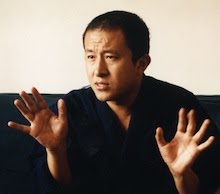In his Guru Yoga, Jamyang Khyentse Chökyi Lodrö said: “If you treat the guru as an ordinary person, and then pray to him, you will have a corresponding result.” So if you think of the guru as a good guy, a compassionate and well-informed man, then that is as much blessing as you’ll get. If you think the guru is a great Bodhisattva on the first bhūmi or tenth bhūmi, then that is the kind of blessing you will receive. And if you think the guru is the Buddha, then you will receive enormous blessings. It all depends on your own attitude. It is all your own perception. You should really try to understand this, because there have been so many misunderstandings about the guru, about guru devotion and about the guru-disciple relationship.
Nowadays, many people in the West think that the whole guru system is a bit like a dictatorship. And in the East, many societies have a very Confucian way of thinking. People believe the leader is always right, even if the leader says, “this wall is black” when it is actually white. Then everyone has to say, “Yes, it’s black.” If you look at China, things still go on like that. Whatever the leaders say goes with many millions of Chinese. At least in the West, with someone like President Bush, he can say something and the whole of America just laughs at him. But in China, whatever the boss says is right and that is it, finished.
But the guru concept is totally different from this kind of idea. It is beyond dictatorship, or the Confucian way of understanding your elders, or the notion that the leader is always right. Why? There’s a very important reason, which you should highlight and keep constantly in your head: Never, ever in the Vajrayāna practice will you see a Guru Yoga practice without the guru dissolving into you. Never. If you find one, it is wrong. I can confidently say that it is either a wrong or mistaken text or that it is being taught by a phoney teacher.
What does this tell you? That the guru is beyond the concept of dictatorship and the Confucian idea of worshipping the leader. When you worship a leader, the leader is always the leader. They are always the good guy or the big guy while you are always secondary. But in the Vajrayāna, the whole purpose of guru yoga and the practice of guru devotion is to recognise that your mind is the Buddha. It is to realise that your mind is the ultimate guru. And to do that, the practice has this dissolution, the merging of your mind and the guru’s mind. There is no ultimate dictator up there, called guru, who directs your everyday life. That is absolutely not the right way to understand this.
As part of the path to recognise that your mind is the Buddha, we then have the outer guru, which manifests as a reflection of your devotion. The outer guru is unquestionably important. I have never denied that. Paying homage and paying respect to whatever your qualified master has said is very crucial. But please don’t forget that the final and most quintessential thing to know is that your mind is the Buddha.
© Siddhartha’s Intent 2001
.jpg)
.jpg)
thank you. i like this subject a lot. I am very devoted to my teachers, almost to blind faith, I go very ga ga over them, but at the same time I know it is me that hired them. So sometimes, well one time, I said "you're fired" like that guy on tv.
ReplyDelete